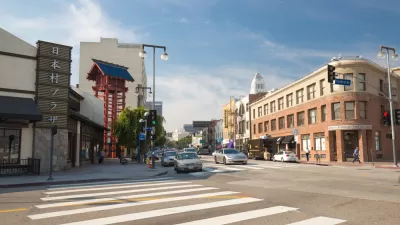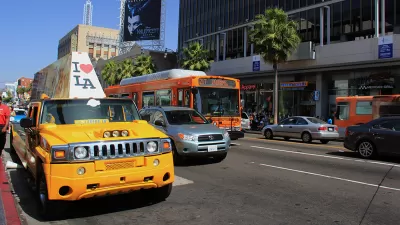Help is on the way. The law that requires the governor's planning office to devise an alternative method for measuring vehicle traffic for environmental compliance will also take up where an earlier law that exempted bike lanes from CEQA left off.
Notwithstanding a 2012 law that specifically exempted bike lanes from the California Environmental Quality Act (CEQA), or so it seemed, the landmark 1970 environmental law has continued to stymie bike planning throughout urban California.
"Los Angeles, Oakland, San Diego and San Francisco [the first in 2006] have faced lawsuits, years of delay and abandoned projects because the environmental law’s restrictions often require costly traffic studies, lengthy public hearings and major road reconfigurations before bike lanes are installed," writes Liam Dillon who covers California state politics and policy for the Los Angeles Times while based in Sacramento.
Dillon also describes the city of Berkeley's inability to place a bike lane near downtown due to CEQA requirements.
“The environmental law is hugely frustrating,” said Dave Campbell, advocacy director for Bike East Bay, which has pushed for the Fulton Street bike lane. “It’s a law that allows you to say no. It’s not a law that lets you say yes.”
I was under the impression that the problem was ameliorated when Gov. Jerry Brown signed AB 2245 in 2012. However, a 2012 analysis by the California Bicycle Coalition described the remaining requirements under the bill which turned out to be more serious than they seemed.
Instead of a cumbersome CEQA process, AB 2245 requires cities and counties to prepare a traffic and safety study of the proposed bike lane project, conduct public hearings to discuss the project’s impact, and file CEQA-exemption notices with the state Office of Planning & Research.
The irony that an environmental law would frustrate the most environmentally-friendly (and efficient) mode of transportation was not lost on Mother Jones blogger Kevin Drum. "I'm a pretty committed environmentalist, but it's still hard not to feel a bit of schadenfreude over the problems that California's premier environmental law has had on the construction of bike lanes," he writes.
But "[t]hanks to a provision tucked into a bill that allowed the Sacramento Kings arena to be built more than two years ago, bike lanes might finally get a green light," writes Dillon.
The bill is SB 743, and the provision the bill reforms is known as level of service (LOS). The new traffic measurement standard that will replace LOS is intended to promote urban, infill development but will also facilitate bike lane planning by changing the transportation metric from traffic congestion at intersections to vehicle miles traveled.
"Since replacing a traffic lane with a bike lane won’t increase the number of cars on the road, the new standard should allow cities to install bike lanes without environmental conflict," writes Dillon.
“It solves our problem completely,” Dave Snyder, executive director of the California Bicycle Coalition told the Los Angeles Times. His group "was preparing to lobby legislators to propose another bill on the matter when SB 743 emerged in late 2013," adds Dillon.
San Diego Bike Lane Lawsuit
In 2014, a "lawsuit filed in the County of San Diego Superior Court [PDF] claim(ed) that the city did an inadequate CEQA analysis for a recent road diet and new bike lane on a stretch of Fifth Avenue," wrote Melanie Curry for Streetsblog LA on December 22, 2014.
Unfortunately, the state’s Office of Planning and Research has not yet completed its guidance on S.B. 743, under which vehicle congestion will be removed from the list of environmental impacts that need analysis.
On January 20, the governor's planning office released a final draft proposal of the "CEQA Guidelines on Evaluating Transportation Impacts," as required by SB 743 for public comment.
In the meantime, Bike East Bay declared victory in their fight for the Fulton Street bike lane.
Hat tip to Michael Keenly.
FULL STORY: Want a bike lane in your neighborhood? It's not so simple in California

Planetizen Federal Action Tracker
A weekly monitor of how Trump’s orders and actions are impacting planners and planning in America.

Congressman Proposes Bill to Rename DC Metro “Trump Train”
The Make Autorail Great Again Act would withhold federal funding to the system until the Washington Metropolitan Area Transit Authority (WMATA), rebrands as the Washington Metropolitan Authority for Greater Access (WMAGA).

The Simple Legislative Tool Transforming Vacant Downtowns
In California, Michigan and Georgia, an easy win is bringing dollars — and delight — back to city centers.

The States Losing Rural Delivery Rooms at an Alarming Pace
In some states, as few as 9% of rural hospitals still deliver babies. As a result, rising pre-term births, no adequate pre-term care and "harrowing" close calls are a growing reality.

The Small South Asian Republic Going all in on EVs
Thanks to one simple policy change less than five years ago, 65% of new cars in this Himalayan country are now electric.

DC Backpedals on Bike Lane Protection, Swaps Barriers for Paint
Citing aesthetic concerns, the city is removing the concrete barriers and flexposts that once separated Arizona Avenue cyclists from motor vehicles.
Urban Design for Planners 1: Software Tools
This six-course series explores essential urban design concepts using open source software and equips planners with the tools they need to participate fully in the urban design process.
Planning for Universal Design
Learn the tools for implementing Universal Design in planning regulations.
Smith Gee Studio
City of Charlotte
City of Camden Redevelopment Agency
City of Astoria
Transportation Research & Education Center (TREC) at Portland State University
US High Speed Rail Association
City of Camden Redevelopment Agency
Municipality of Princeton (NJ)




























